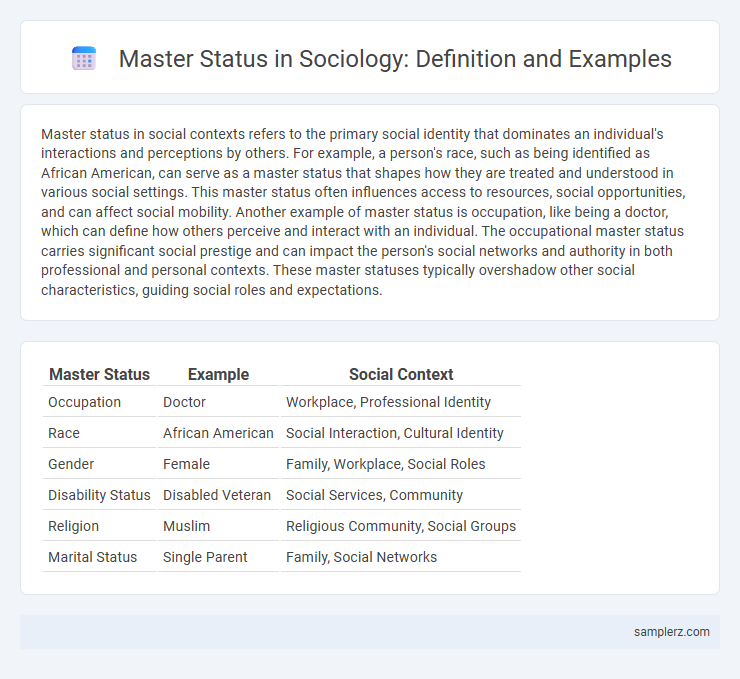Master status in social contexts refers to the primary social identity that dominates an individual's interactions and perceptions by others. For example, a person's race, such as being identified as African American, can serve as a master status that shapes how they are treated and understood in various social settings. This master status often influences access to resources, social opportunities, and can affect social mobility. Another example of master status is occupation, like being a doctor, which can define how others perceive and interact with an individual. The occupational master status carries significant social prestige and can impact the person's social networks and authority in both professional and personal contexts. These master statuses typically overshadow other social characteristics, guiding social roles and expectations.
Table of Comparison
| Master Status | Example | Social Context |
|---|---|---|
| Occupation | Doctor | Workplace, Professional Identity |
| Race | African American | Social Interaction, Cultural Identity |
| Gender | Female | Family, Workplace, Social Roles |
| Disability Status | Disabled Veteran | Social Services, Community |
| Religion | Muslim | Religious Community, Social Groups |
| Marital Status | Single Parent | Family, Social Networks |
Understanding the Concept of Master Status in Society
Master status in society refers to a primary social identity that overshadows all other statuses an individual holds, significantly influencing how they are perceived and treated. Examples include a person's occupation, such as a doctor, or a defining characteristic like disability, which can dominate social interactions and shape personal experiences. This concept highlights how certain statuses can dictate social roles and expectations, often impacting access to resources and social power.
Classic Examples of Master Status in Social Contexts
Master status in social contexts often manifests through roles such as race, gender, and occupation, which significantly shape individual identity and social interactions. For instance, a person identified primarily by their profession as a doctor may experience social expectations and privileges linked to that role above other statuses. Classic examples include the master status of being a racial minority or a parent, where these identities dominate social perception and influence access to resources and social power.
Race and Ethnicity as Master Statuses
Race and ethnicity often function as master statuses because they profoundly influence individuals' social interactions, opportunities, and identity. For example, a person's racial or ethnic background can shape their experiences with discrimination, access to resources, and societal expectations. These statuses frequently overshadow other personal characteristics, defining how individuals are perceived and treated in various social contexts.
Gender Identity: A Prominent Master Status
Gender identity serves as a prominent master status shaping social interactions and individual experiences, often influencing access to resources and societal roles. For example, transgender individuals may encounter distinct social recognition and challenges that overshadow other aspects of their identity such as occupation or ethnicity. This master status impacts social perception, legal rights, and personal identity affirmation within various cultural contexts.
Occupational Roles as Master Status Examples
Occupational roles often serve as master statuses by defining an individual's identity through their profession, such as a doctor or teacher, which shapes social interactions and expectations. For example, a judge's role commands authority and respect, influencing how others perceive and behave toward them across various settings. These roles frequently overshadow other social statuses, becoming central to an individual's social identity and societal recognition.
Disability as a Defining Master Status
Disability often serves as a master status that shapes an individual's social identity and interactions, overshadowing other personal characteristics such as occupation or ethnicity. This dominant status influences how society perceives and responds to the person, frequently leading to stigma or altered social roles. Recognizing disability as a master status is crucial for addressing social inclusion and equality in diverse communities.
Age as a Socially Assigned Master Status
Age serves as a socially assigned master status that shapes individual identity and social interactions across diverse contexts. It influences access to resources, roles, and expectations, often overriding other personal characteristics such as occupation or ethnicity. For example, elderly individuals may be primarily perceived through the lens of age, affecting their participation in the workforce or social activities regardless of their other attributes.
Religion and Its Role as a Master Status
Religion often serves as a master status by profoundly shaping an individual's social identity and interactions across diverse contexts. This master status influences perceptions, guiding behavior and social expectations within communities and institutions. For example, a person's religious affiliation can dominate social roles and relationships, outweighing other statuses such as occupation or nationality.
Sexual Orientation as a Visible Master Status
Sexual orientation often functions as a visible master status, profoundly influencing social interactions and individual identity. This status can shape perceptions, expectations, and treatment within various social contexts, affecting opportunities and social inclusion. Recognizing sexual orientation as a master status highlights its critical role in the dynamics of social stratification and identity politics.
The Impact of Master Status on Social Interactions
Master status, such as being a CEO or a person with a disability, significantly shapes social interactions by dominating how others perceive and respond to an individual. This dominant identity can influence opportunities, power dynamics, and social expectations, often overshadowing other social roles or attributes. Consequently, the master status can either facilitate inclusion or reinforce social barriers, impacting relationships and social networks.

example of master status in social Infographic
 samplerz.com
samplerz.com